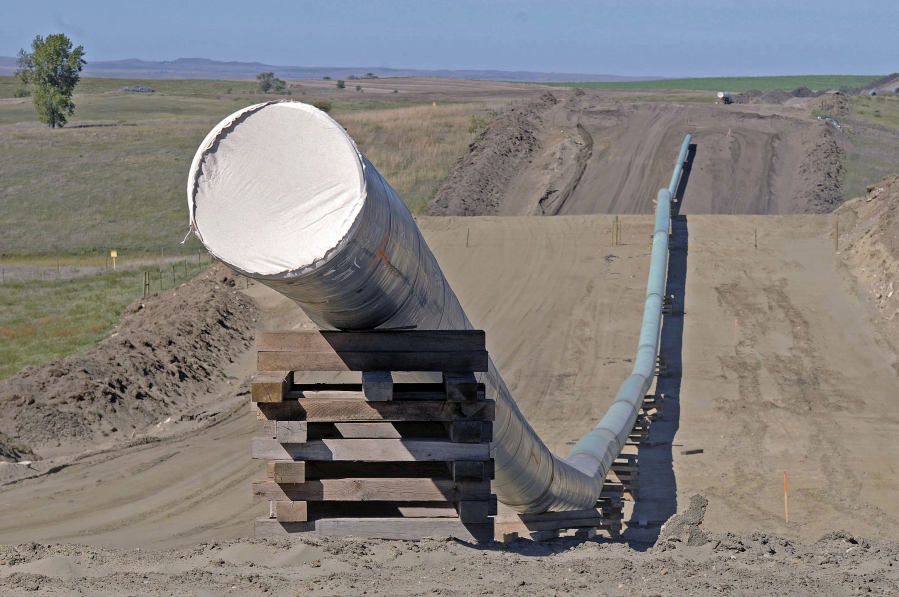Almost as soon as the Trump administration took office, the future of the Dakota Access pipeline looked certain.
Any hopes held by protesters that the 470,000-barrels-per-day project could be stopped were further diminished on Thursday when North Dakota law enforcement closed their main camp and arrested more than 40 people.
So what does the North Dakota oil pipeline mean for Vancouver Energy, the 360,000-barrels-per-day crude-by-rail terminal that would receive Bakken crude at the Port of Vancouver before loading it onto vessels destined for West Coast refineries?
It depends on whom you ask.
In a blog post earlier this month, the Sightline Institute, a Seattle-based think tank focused on sustainability in public policy, argues that many changes in the energy market have shifted the landscape against the terminal since it was proposed in 2013.
Clark Williams-Derry, Sightline’s director of energy finance, wrote a post titled “Did Trump Just Kill a Northwest Oil-By-Rail Project?’
In it, he argues that Bakken oil producers are struggling against low international oil prices. And while the Bakken’s production has declined — down to less than 1 million barrels of oil per day this month versus the roughly 1.24 million barrels per day at its peak in 2014 — more refineries and pipelines have come online to move the product out of the Dakotas.
To bolster his point, Williams-Derry refers to a report from the U.S. Energy Information Administration showing crude-by-rail shipments out of the Upper Midwest in November were down by nearly two-thirds from their 2014 peak.
“There’s no sign of long-term growth in Bakken oil, and (the Dakota Access pipeline) is just going to make oil-by-rail less attractive,” Williams-Derry told The Columbian in an email. “So unless Vancouver Energy thinks it’s going to source its oil from some other yet-to-be-determined region, it’s likely to be a stranded, underutilized asset from day (one).”
He said oil companies are currently seeing greater return on investment in the Texas oil fields than those in the Midwest.
Officials from Vancouver Energy — a joint venture of Tesoro Corp. and Savage Cos. — wave off Williams-Derry’s argument as conjecture.
“That piece is based on speculation,” Vancouver Energy General Manager Jared Larrabee said. “It doesn’t consider the fact that the markets are constantly changing and constantly evolving, which is precisely why a project like this is needed for the West Coast.”
He said production fluctuations have always been part of the oil industry and added that the oil rig count in the Bakken is currently increasing.
Larrabee isn’t worried about pipelines competing with the Vancouver project. He said the Vancouver Energy terminal was proposed around the same time as the Dakota Access pipeline. Since then, the company’s commitment to building the largest terminal of its kind in the U.S. hasn’t faltered.
For that matter, he said, there are still relatively few pipelines in the United States and none that cross the Rocky Mountains to deliver crude to the West Coast.
Even though oil prices and Bakken production are at a historic low, they’re starting to rebound, and Larrabee sees market opportunities on the horizon.
Recently, the International Marine Organization upheld its 2020 implementation date for new low sulfur marine fuel. Larrabee said the Bakken crude that Vancouver Energy would deliver to refiners in Washington and the West Coast meets those standards.
“That’s one of those changing dynamics that is very positive,” he said.
Additionally, if the federal government implements a border adjustment tax, which taxes goods imported to the U.S. but not exports, the policy would discourage the import of foreign oil.
Currently, about 40 percent of the West Coast’s transportation oil is sourced from foreign counties, Larrabee said.
Eric Jessup, co-director of the Freight Policy Transportation Institute at Washington State University, isn’t entirely convinced the Dakota Access pipeline would by itself make Vancouver Energy unprofitable.
He said the pipeline will lower transportation costs, and Bakken oil producers will likely start uncapping wells and drilling more holes. In his view, whether Vancouver Energy is negatively affected by the pipeline largely depends on the long-term response of Bakken producers.
Tesoro, one of the companies involved in Vancouver Energy, has purchased transportation and storage operations in the Bakken region, including a feeder pipeline that would connect to the Dakota Access pipeline.
“So they have some influence on how volumes move out of that region and they also have an incentive to make the plant in Vancouver profitable,” Jessup wrote.
Furthermore, the rail companies that originally signed to move crude to Vancouver have invested a lot in their own infrastructure over the last several years, and they would likely be willing to renegotiate shipping rates to maintain volumes.
“At the end of the day, it’s a margin business,” Jessup wrote. “I wouldn’t necessarily say the plant in Vancouver is dead in the water by any means.”




